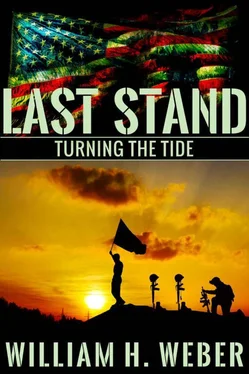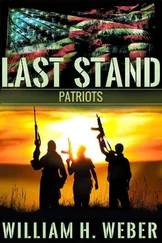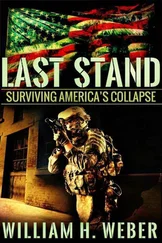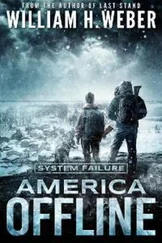“Reese,” John called out over the walkie. “I’ve got three tangos on your three o’clock, red-brick building. South side.”
Reese didn’t answer, but his Barrett did. The distinctive boom of his sniper rifle sounded just as John was laying down his own covering fire. The .50 cal round impacted the first two men, who were standing in a line, painting their insides against the wall next to them. The third soldier ran for cover. A second blast from Reese’s Barrett killed the third man. Although the sniper’s fire was helping to suppress the enemy, the deafening percussion was threatening to give away his position.
Moss pulled Heller back to the tree line as more fire came in, this time from the east.
“They’re all around us,” Moss gasped, checking for signs of life.
“What about Gardner?”
“He’s gone. Took a direct hit to the head. Didn’t feel a thing.”
John called out to Devon to cover the east.
“We don’t get out of here soon, boss, we never will.”
John nodded, scanning through his ACOG for the source of the fire they were taking.
“Colonel,” Reese said, “I’m taking fire from somewhere west of you. My position’s been compromised.”
“Don’t wait for us, Reese. Soon as you’re off that roof, hightail it back to Oneida. We’ll meet you there.”
“Affirmative,” the sniper said, the sound of rounds pinging off the metal siding before him nearly drowning out his words.
“We’re gonna need to make a break for it,” John told Moss. “You grab the horses while Devon and I lay down some covering fire.” He turned to tell Devon to cover the western approach when a round went straight through the young soldier’s neck. Devon’s eyes grew impossibly wide as he dropped his weapon and clamped his hands down over the wound. The next shot was fatal and Devon fell face forward into the brush.
The human part of John wanted to scream. The blond young man had started as a member of Moss’ security team and had become something of a surrogate son to John. Staggering back on legs weakened with disbelief, John untied his horse and grabbed the reins of another. They would need to leave one horse behind. He and Moss charged out from the forest’s edge, without any covering fire. The rounds came as soon as they hit the train tracks. The brown mare John was holding with his right hand took a hit, whinnied and dropped. Bullets seemed to be coming in from every direction as he and Moss leapt over the tracks and into the woods beyond. For a moment the firing stopped as the gunmen gave chase.
With three of his best men lying dead and their own fate yet to be decided, one thing was clear. This hadn’t been a case of bad luck. Someone had been waiting for them.
Knoxville, one hundred and sixty days before EMP
“You mentioned looking for a job, John,” Tom Bukowski, his VA counselor, said. “How’s that going?”
John removed his 278th Armored Cavalry ball cap and rested it on one knee. “Pretty good, I’d say. I’ve always been pretty handy, so I guess it seemed natural to start a small general contracting business.”
“That’s great. And what about the drinking?”
Nodding, John rubbed his lips with the tips of his fingers. “Some days are better than others. I haven’t touched a drop in weeks. But I don’t think alcoholism was ever my problem.”
“Really?”
“Drinking was an easy way of numbing the pain. Could as easily have been oxycodone if I’d been more seriously wounded, like some of the men I served with.”
Tom nodded and smiled.
Nearly seven months before, after Diane had confronted him about his drinking, John had taken her advice and paid a visit to his local Veterans’ Counseling Center. He’d explained that he was having trouble readjusting to civilian life. After a short wait, they’d introduced him to one of the counselors: Tom Bukowski, a former Army intelligence officer who’d been deployed to the Former Yugoslav Republic of Macedonia and Bosnia as well as North Africa. He was round-headed and quick to smile. John had taken to the man. They’d even served in some of the same theatres of operation, which had helped to put his mind at ease.
John’s greatest reservation about getting help had been being labelled a coward and letting down the men he’d served with. Although he had known on some level that something inside wasn’t right, he’d never had a name for it. He hadn’t spent more than a few minutes describing the feelings plaguing him before Tom had suggested he might be suffering from post-traumatic stress disorder. During the Civil War it was known as the soldier’s heart; in World War I, shell shock; and in World War II, battle fatigue. Differing names aside, the symptoms had largely been the same. Lack of sleep, loss of concentration, increased irritability, drinking and drug use and in some cases violence or suicide.
The explanation had made him think immediately of his former JTAC Christopher Lewis. Had his friend gone to seek help? John doubted it. If he had, he would likely be alive today. Struggling, as most frontline combat veterans were, but alive nonetheless.
The two men sat on soft folding chairs facing each other in one of the session rooms when they spoke. It was meant to be relaxed and informal.
“You know how important it is to stay active,” Tom told him, clicking the end of his pen. “In the months we’ve been meeting, you’ve opened up about the guilt you carry around over the death of men under you. That feeling might never go away completely, but it’s important, at least for now, that you keep pouring your energy into something positive.”
John reached behind and produced a white plastic tube. He unplugged one end and removed a rolled-up piece of paper. “Funny you should mention that. I’ve been sketching out some plans I’d like you to have a look at.” John handed the rolled paper over and Tom opened it, studying the image.
“What is this?” Tom asked.
“It’s my pod.”
“Your what?”
“I’ve got some money set aside and decided to take your advice about funneling my energy into more constructive pursuits. You’ve been around the world, so I don’t need to tell you we live in a country that’s been largely sheltered from civil unrest. Everything we have is built on a precarious foundation that could come crashing down if the economy goes belly up or the lights are ever shut off for good.”
“You’re talking about an apocalyptic scenario,” Tom said, looking uncomfortable.
“Call it what you want,” John replied. “I’m not one of those guys standing on street corners with drool down my chin prophesising the end of the world or anything. But if I learned anything in the military it was that redundancy is key. You know how they say, ‘No plan survives first contact?’ Well, through our sessions I’ve come to understand why I’ve had such a difficult time readjusting. I’d adapted.”
Tom looked at him quizzically. “Adapted? In what way?”
“I’d adapted to an environment in Iraq where threats were constant and unpredictable. There was no safe hiding place and that had me always on edge. And once the threat had dissipated, I found it was impossible to turn that survival mode off. It was a winning state of mind in Iraq, but a losing one back home.” John rubbed the scar that ran across the palm of his hand. “The pimply kid packing your groceries probably isn’t a threat, neither is your son’s grade-school teacher, but when you apply the mindset which saved your behind in Iraq to the folks back home, you start looking crazy.”
Tom looked pensive. “So you feel that channeling those feelings into helping to protect your family in a worst-case scenario has helped?”
Читать дальше












